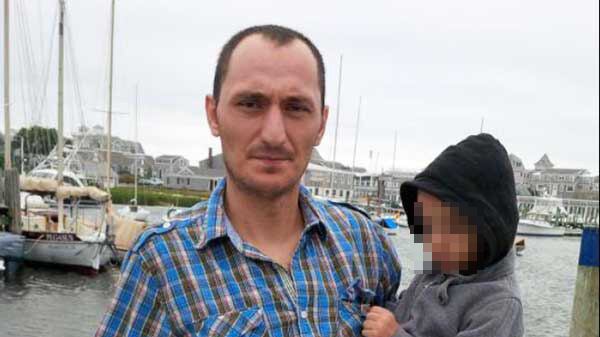“Sir, when did you first meet Tamerlan Tsarnaev?” asks prosecutor Mary Kelly.
It’s the fall of 2013 and Mustafa Ozseferoglu, then 29 years old, is sitting before the U.S. Immigration court in Boston with his hands cuffed behind his back and a chain tied around his waist. He’s representing himself.
“If that pressure cooker was a couple of years old, what was the DVD instruction on how to operate a pressure cooker doing in your trash in 2013?” asks Kelly. He says he disposed of it in a public waste bin and had bought the cooker at Macy’s in 2009. His girlfriend used it to cook beans.
Ozseferoglu is not charged with crimes in connection to the 2013 Boston Marathon bombings that left three dead and injured 264 more, but a 2009 stint delivering pizza with the elder bomber was coming back to haunt him. His attorney, Carlos Estrada, who is handling his appeal says Immigrations Customs Enforcement (ICE) would never have detained his client if not for his connection to Tsarnaev.
“They ruin my life. They ruin so many people’s life. I just don’t understand. What kind of people? What kind of family they get raised by? They’ve got to be insane,” Ozseferoglu says of the Tsarnaevs in a phone call with The Daily Beast from the Suffolk County House of Correction.
“I don’t know how this system can put me and people like myself—put them in the same category.”
At the time, Ozseferoglu was in court asking for the judge to cancel deportation proceedings so he could stay in the country with his sickly, then-4-year-old son, Osmon. Judge Steven Day ruled to deport him back to his native Turkey. But more than a year and a half later Ozseferoglu is still behind bars, fighting a deportation a doctor says will threaten Osmon’s life.
Open arguments in the trial of Dzhokhar Tsarnaev, the man who along with his brother Tamerlan Tsarneav set off two pressure cooker bombs at the Boston Marathon finish line, began last week.
Dzhokhar is the only living person facing charges for the attack itself. His brother died in a shootout with police. But since Dzhokhar’s 2013 arrest, there have been seven reported instances where the Tsarnaevs’ friends and associates—although not accused with planning or carrying out any part of the attack—have faced charges ranging from lying to federal agents to throwing out the bombers’ backpack filled with fireworks to gun possession.
Ozseferoglu’s September 13, 2013, arrest on immigration charges brought that number up to eight.
So who is he?
“A person of interest” in the marathon bombing attack, according to the Board of Immigration Appeals. “The respondent’s name was raised in conjunction with one of the alleged bombers,” according to a statement from the panel.
Kelly also cites inconsistencies in Ozseferoglu’s account of his life and relationship with the Tsarnaevs as well as allegations of abuse by his estranged wife. His wife, who is not the mother of his child, never pressed charges. (She requested not to be named in this article because she feared for her safety.)
Ozseferoglu says she lied to the federal agents who asked her questions about him in 2013. He doesn’t deny the inconsistencies in his stories. He says he was trying to distance himself from the Tsarnaevs and legitimize his immigration status to protect his family.
Estrada says the jump to connect his client to terrorists is a leap too far.
“There were probably dozens, if not hundreds, of ‘persons of interest,’” says Estrada. “Mr. Ozseferoglu has never been charged with any crime related to terrorism.”
“He is trying to stay here for his kid,” says Estrada. “He hasn’t done anything wrong. His only mistake was knowing this guy.”
Estrada says that even though Ozseferoglu came to America illegally over the Mexican border in 2000, when he was 16, Ozseferoglu deserves prosecutorial discretion because of the undue harm it would cause American-born Osmon if he were to be deported.
Ozseferoglu’s son was born with Ellis-van Creveld syndrome, a disease that affects bone growth. He was born with six fused fingers. In a letter, his primary care doctor, Aida M. Yavshayan, M.D., wrote that—even though Osmon has outgrown many of the symptoms—she “doesn’t know what to expect next.” She wrote that Osmon also suffers from asthma, which frequently requires a nebulizer that runs on electricity.
In the small village in the Rize province of northeastern Turkey, where Ozseferoglu grew up, the electricity sometimes shuts down for days. A nebulizer may not always work. Ozseferoglu says he would have to bring his family to his hometown. When he returns home, he will be forced to enlist in one-year mandatory military service and would not be able to care for his family or son.
The first time agents came to Ozseferoglu’s door was in July of 2013. Ozseferoglu says he offered the two agents Turkish tea, which they declined, and then they sat in the living room for several hours. They asked Ozseferoglu about his own beliefs and personal habits. “I drink but I don’t pray,” he told them. But mostly the agents were interested in his relationship to Tamerlan Tsarnaev.
Ozseferoglu met Tamerlan through his father, Anzor Tsaranev, who repaired cars in a parking lot outside Yayla Tribal Rugs in Cambridge. Anzor had good prices and spoke Turkish, so he was very popular in Ozseferoglu’s insular community of immigrants.
He first came to Anzor when his 1992 silver Toyota Camry broke down on Soldiers Field Road.
“It was one of those [cars] you drive two days and definitely next day you’ve got to repair for a day,” Ozseferoglu told The Daily Beast.
Ozseferoglu came to Anzor for repairs regularly. When Anzor asked him why his cars were so rundown, he told him that he delivers pizza for Boston Pizza Express. Pretty soon after that, Tamerlan applied for the job too.
Boston Pizza Express, has since gone out of business, but in 2009 it was located at 1026 Commonwealth Avenue, near Boston University. Ozseferoglu and Tamerlan worked together for between three weeks and three months, a rough estimate that was scrutinized heavily by the prosecution.
Tamerlan “was a Cambridge street kid; spoke Cambridge street slang,” says Theodore Kakridas, who owned Boston Pizza Express at the time. At the pizza shop, Tamerlan went by the nicknames “Tamuir” or “Rocky.”
Kakridas remembers Ozseferoglu as a “hard worker.” He didn’t know Ozseferoglu didn’t have legal residency because he had a social security number, obtained through his first marriage.
Both Ozseferoglu and Kakridas say the only thing slightly unusual about Tamerlan was that he regularly prayed in the parking lot. Ozseferoglu also says that Tamerlan didn’t like it when people swore.
“He would either jump in and try to fix the conversation or change the conversation to another direction,” he says.
In Ozseferoglu’s immigration hearing, the number of phone calls between him and Tamerlan during this period of time were called into question. Kelly says the two contacted each other about 100 times. Ozseferoglu says these calls weren’t illicit, or even personal. The two, he says, were just coordinating pizza deliveries.
“When we’re going on delivery, we take some of the deliveries and we call the other driver,” he explains.
In his hearing he was also questioned about a couple phone calls the two exchanged after working together. Ozseferoglu isn’t sure of the date exactly, but he saw the Tsarneav brothers in 2013, near the time of the bombing.
“I was driving on Brighton Ave, turning onto Linden Street in Alston, and I saw Tamerlan with his car, waiting on the light and I was turning,” he says, adding that Tamerlan was with his younger brother. “I say, ‘How’s business?’”
“It was like a few seconds,” he says. “I was in the minivan. I told them that minivan had a transmission problem, and you know, I’m looking to repair that. And that’s when I call and ask—you know, transmission repair,” he says.
He got Tamerlan’s new number, he says, and Tamerlan gave him a recommendation of where to get his car fixed. Anzor had moved back to Dagestan at this point.
Estrada says that even though Ozseferoglu was never charged, the government attorneys’ constant questioning of Ozseferoglu’s run-ins with the Tsarnaevs “was sort of a wink-wink message to the judge that, ‘Hey, maybe this guy knew something we don’t know.’”
In the first visit to Ozseferoglu’s Watertown home, agents showed him photos of the Tsarnaev family, and asked him to identify Tamerlan. Then, on September 13, 2013, they returned a few weeks later with Watertown police officers.
Law officers took photos of his girlfriend’s pressure cooker and Ozseferoglu was arrested.
Exactly how federal agents became aware of Ozseferoglu is unclear. Agent Robert Marshal, who testified against Ozseferoglu, says it was because of his phone contacts with Tsarnaev.
But Marshall and Kelly also mention a pressure cooker that Ozseferoglu threw in a public trash bin before the Boston Marathon, along with a few identifying documents. “I believe someone found it and brought it to the Watertown Police. I don’t believe Watertown Police were searching his trash,” Marshall testified.
Exactly why a pressure cooker manual sparked the interest of law enforcement before the Boston Marathon bombing is still unclear.
A spokesperson from Homeland Security referred questions about the bombing trial and investigation to the U.S. District Attorney’s office. A spokesperson there declined to comment, citing the ongoing trial.
Immigration attorney Ellen Sullivan says that despite Osmon’s disabilities, convincing a judge to cancel deportation proceedings will be difficult, especially since the government doesn’t need to prove Ozseferoglu was in any way involved in the bombing.
“They do not want to let anyone out who has any connection to this story,” says Sullivan.
“If any of this is even spoken of in the immigration court, the immigration court is going to have a very strong reaction,” she says.
Sullivan also says that Estrada will not only have to prove that Ozseferoglu’s son will suffer from an extreme or unusual hardship, but that Ozseferoglu’s “moral character” is in good standing as well.
This is proving to be a tough burden to overcome. The appeals court argues that Ozseferoglu “had information regarding the perpetrators of a terrorist event but did not choose to contact law enforcement as soon as he could have.”
Even though the appeals court argued that Ozseferoglu had an “obligation” to come forward, failing to inform on your old co-workers is not a crime.
“It is a crime not to tell on your neighbors in Soviet countries but not here,” according to former federal judge and Harvard law professor Nancy Gertner.
But Ozseferoglu may have other “moral character” hurdles to get over, as well.
His estranged wife says they met on Match.com in 2004 after her husband was burned alive in a fire, leaving her alone at 23 years old with three children. She is legally deaf.
“He’s not the person that he says he is,” she told The Daily Beast. After they were married at Boston City Hall, she says, “It was like he was a completely different person.”
She says she didn’t know he was an illegal immigrant and he threatened to hurt her children if she didn’t sign his immigration papers. At one point, she alleges, he put his hands around her throat to choke her.
Her roommate, Flerida Pena, says she saw it happen.
“He was mad about something. I don’t know, but I could see [that],” she tells The Daily Beast through a phone translator. “I saw him have his hands around her neck like he was choking her.”
Ozseferoglu maintains that this is a lie, that he did not abuse her, and that he left because she cheated on him.
“The best way to describe the situation is I dump her,” he says.
His wife signed immigration papers, but it didn’t work. Ozseferoglu was later denied citizenship.
His temper appears to have flared a few days before his arrest, too. Ozseferoglu was running a package delivery service at the time, and on September 7, 2013, his employee, Hasan Atis, said Ozseferoglu threatened to kill him and pressed charges at the Boston Municipal court.
In broken English, Atis told The Daily Beast that Ozseferoglu is “garbage,” “trash,” and “liar people.”
Ozseferoglu concedes he yelled at Atis on the phone that day because Atis was hanging out with his girlfriend and didn’t show up to work.
The incident does not appear in the minutes of Ozseferoglu’s immigration hearing.
But attorneys say what did come up in Ozseferoglu’s immigration hearing is unusual.
In a statement, ICE spokesperson Daniel Modericker said that estranged spouses in immigration cases are contacted when agents believe they have relevant information “and time and resources allow for further investigation.” But Sullivan says that, in practice, ICE officers don’t typically seek out information from detainees’ estranged spouses.
“I’ve been practicing for over seven years and I’ve handled many bond hearings and I’ve never seen anything close to the level of effort uncovering any information that could appear damaging in his case,” says Christina Corbachi, who handled Ozseferoglu’s bond hearing before he dismissed her.
Meanwhile, Estrada has filed a new appeal for Ozseferoglu’s release, as well as a habeas corpus petition that would release Ozseferoglu until a decision is made.
Ozseferoglu’s girlfriend, the mother of his child, was denied prosecutorial discretion last week. She is set to be deported.
Estrada is also representing Konstantin Morozov, another Tsarnaev associate who says he was detained by federal agents after refusing to become an informant. Estrada declined to discuss Morozov’s case for this interview.
“The sympathy factor is just not there for any of these people,” says Estrada. “No matter how unrelated they may have been to the bombing, the knee-jerk reaction is to deport them all.”




